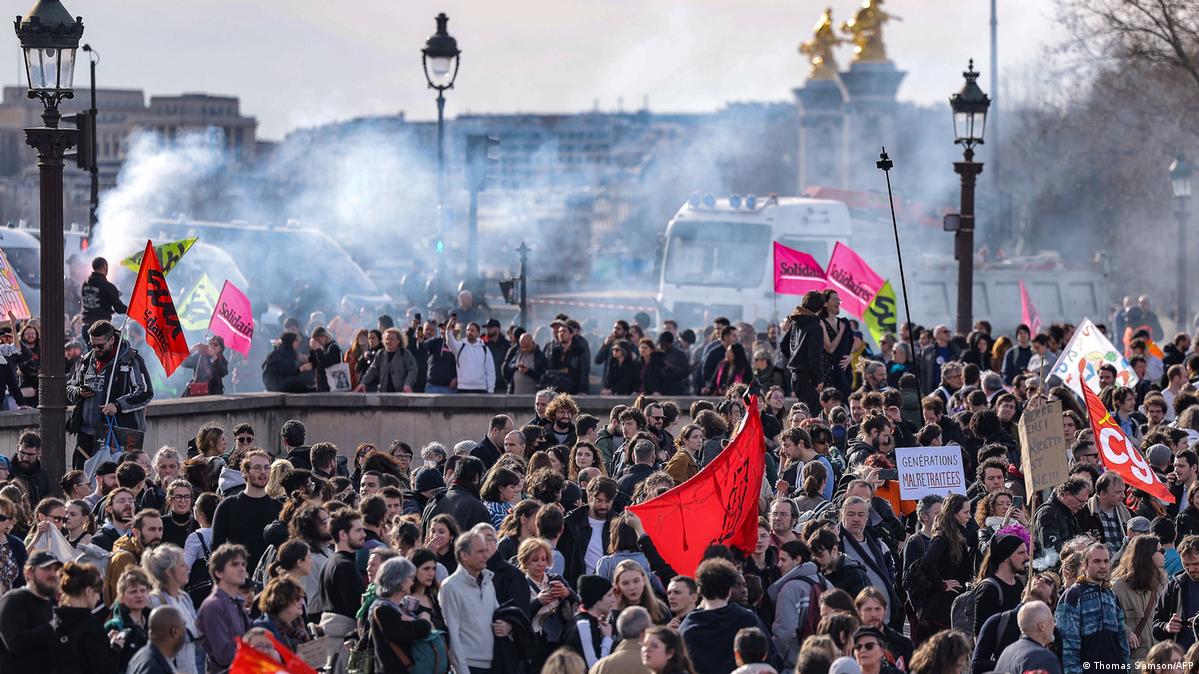Chaos reigned in the streets of Paris in recent months, as protests grew against the pension reform being battled out in the French government. Hundreds of thousands of citizens joined in public demonstrations, over 10,000 pounds of trash piled up, and a restaurant reportedly favored by President Emmanuel Macron was set on fire. Some protests drew over one million participants. Strikes have brought critical public sectors, such as transportation, education, and sanitation, to a halt. Many of the strikes and protests have been organized by labor unions, which have also engaged in talks with Prime Minister Élisabeth Borne to voice their opposition to the reform. Public outrage reached a peak as France’s highest council on constitutional affairs was set to issue a ruling that would ultimately determine that the pension bill is constitutional.
The French public’s backlash illuminates some of the larger socio-political conflicts at play. The pension reform heavily impacts the working class, but has less of an effect on the wealthy. Macron was elected to office as a champion of labor rights who promised to take a stand against wealth inequality. Now, he is facing criticism for doing the very opposite: His policies aid the wealthy at the expense of the working class. This isn’t just a fight for labor rights; it’s a part of a larger class struggle that is being perpetuated by decisions Macron is making.
The pension bill in question proposes that the retirement age be raised by two years. For most people this increases the retirement age from 62 to 64, but those working labor-intensive jobs, such as trash collectors, would have their retirement aged from 57 to 59. Opposition to this notion is further incensed by the way it was pushed through the legislative system. In the legislative elections of 2022, Macron’s government lost its absolute majority in the National Assembly, France’s governing body. Without their seats, they can no longer pass laws through a simple majority. As a result, they have resorted to implementing Article 49.3, which is a constitutional tool that passes a law in Parliament without a vote. Since earlier implementations of Article 49.3, Macron’s government has narrowly survived two no-confidence votes in Parliament. There is a historical precedent for the government to cease using Article 49.3 once considerable opposition to its use has occurred. However, the opposition has not stopped Macron from invoking Article 49.3 to implement this pension bill. In doing so, these protests have become just as much about whether the legislative process is reflective of the will of the people as it is about the actual substance of the bill itself. Borne explained that the bill prevents the weight of deficits from causing the French fiscal system to collapse. She maintains that allowing the deficits to grow would increase taxes and reduce pensions.
Beyond the Article 49.3 controversy, the bill itself is also a source of protest because of the additional two years of work, which particularly impacts the working class. Plenty of jobs that do indeed involve physical activity are not categorized as labor-intensive by the reform bill, leaving workers to labor until the age of 64. Bricklayers, retail workers, nurses, and restaurant workers are among those relegated to this new retirement age. Many are outraged because they believe hard labor is unsustainable over such a long period of time. Those who do not work manual labor jobs are more easily able to accommodate the change in retirement age because they do not engage in physical labor that wears out the human body if sustained over a longer period of time.
Another layer of injustice is the ability to partake in the protests and demonstrations themselves—most working class people are unable to participate without losing the wages they need to survive. This is particularly true for residents of banlieues, suburbs composed of mostly immigrant and working class peoples. The inability to join in on the protests on an issue that heavily impacts their lives is ironically representative of how this incorporates into a larger class struggle.
This is not Macron’s only decision that has benefited the elite. During his first year in office, in December of 2018, he abolished a wealth tax known as the impôt sur la fortune (ISF), which applied to people with real estate assets over €1,300,000. Instead, there is now a flat tax of 30 percent on wealth and a tax on real estate. This change overall decreased the taxes on the wealthy under the philosophy that the money they now had would be reinvested in the French economy. A 2019 study instead shows that “the incomes of the wealthiest 0.1 percent of French people have sharply increased.” The long-term impact of this decision remains complex and unclear, but the short-term results have fed negative sentiment among the working class of France toward Macron and his government.
Macron’s economic changes may very well be ones that he believes are the only hope of managing France’s increasingly complex social landscape. But the sustained resistance from the people has made it clear that they are only a bandaid for increasing social stratification. If Macron hopes for reelection in the coming year, they are voices he cannot go long ignoring.
